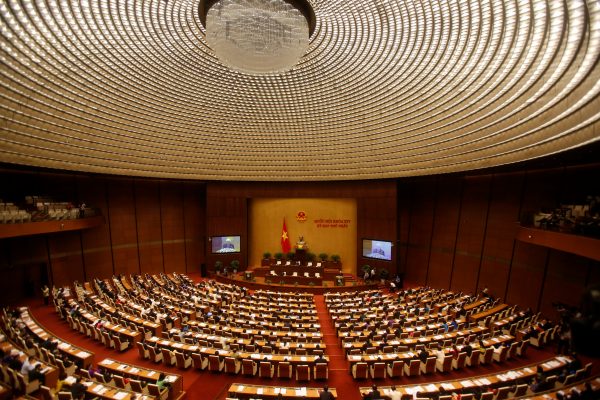Anything from Nike sportswear to Samsung smartphones are manufactured in this hub of ASEAN global production networks. As the United States has put the screws on trade with China, Vietnam has benefited from increased interest from multinational investors as an alternative location for low cost production. Thirty years ago, Vietnam was one of the poorest countries in the world. Last year, its per capita GDP at current exchange rates was just over US$2500. Vietnam appears to be headed rapidly towards achieving middle income levels.
Three main factors account for the rapid turnaround in Vietnam’s economic fortunes. It has embraced international trade liberalisation with enthusiasm. It brought down barriers to trade after its commitment to membership of the ASEAN group in 1995, gained accession to the WTO in 2007 and signed on to free trade agreements along the way, most recently the Comprehensive and Progressive Agreement for Trans-Pacific Partnership (TPP-11). It’s complemented foreign trade liberalisation with domestic reforms through deregulation and lowering the cost of doing business. And it has invested heavily in human and physical capital, predominantly through public investments.
While the country continues as a one-party state under the political control of the Vietnam Communist Party, economic liberalisation and reform has effected a remarkable social and political transformation that has lifted social welfare.
But economic liberalisation chafes against political control and the continuing heavy presence of the state-owned enterprise sector has been a fertile ground for corrupt officials in their dealings that intersect with the market.
Last year, a number of high-profile officials were charged with fraud connected to the state-owned PetroVietnam Construction Joint Stock Corporation and Sacom, Ocean and Vietnam Construction banks. PetroVietnam’s chief executive officer was sentenced to death and fellow executive Trinh Xuan Thanh was sentenced to double life terms in prison.
A full-fledged anti-corruption campaign reached into the highest-level of the party-state apparatus. In January 2018, Dinh La Thang became the first member of the Party’s Politburo to be sentenced to prison in decades and Truong Minh Tuan, Minister of Information and Communications, was dismissed. Bui Van Thanh, a deputy minister in the Ministry of Public Security, and Dinh Ngoc He, chairman of the military’s Thai Son Joint Stock Company, were arrested. Party officials in Da Nang and Ho Chi Minh cities and other provincial officials were also caught in the web.
Until a few years back, Vietnam seemed to have lost its revolutionary spirit and moral principles and the ruling elite had begun to look more like a mafia organisation, skimming off a substantial fraction of the surpluses from Vietnam’s economic growth for private benefit. But since 2016, Nguyen Phu Trong has consolidated command of the Party, foiling Nguyen Tan Dung’s bid to supplant him as general secretary, and was installed concurrently as president when Tran Dai Quang died last September. Trong, an avuncular-looking political theoretician, has ratcheted up the anti-corruption campaign and doubled down against political liberalism.
In our lead essay this week, David Brown, observes that ‘the public, initially sceptical that the party-state’s campaign against corruption would endure, has been impressed as indictments piled up against a long list of senior officials and businessmen’.
‘Trong is the first leader in a long time to make headway toward restoring the party’s image’ says Brown. ‘Two years ago, the Vietnam Communist Party endorsed a list of 27 deviations, including not only “opportunism” but also the notion that the Vietnamese party-state could ever evolve into a pluralist democracy. A soft purge of tainted cadres is well underway’.
All this might sound familiar. The quest for political and moral purity, married to the consolidation of political power, alongside achieving prosperity through an open, market-based economy is what Vietnam’s big neighbour under President Xi Jinping is also struggling with, though Xi is more geopolitically exposed than Trong in Vietnam. They are, of course, very different characters, but it is not much of a stretch to see Xi’s dream of ‘making China strong again’ as the flipside of Trong’s ‘saving Vietnam from moral decay’.
The more telling comparison will be of how the struggle to restore the integrity of the Party in both China and Vietnam affects economic outcomes over time. Certainly, political retrogression would appear to impose higher costs on an economy like China’s on the cusp of transition from middle income to advanced economy standing than on an economy such as that of Vietnam’s that is still catching up on the way to middle income status.
Middle income countries are defined by their distance from the global technology frontier and their ability to upgrade, catch up and innovate is important for closing that distance. Above all, to reach the frontier, countries need to be open to ideas and have institutions that allow for more complex interactions across the domestic economy and across the world. That includes good governance characterised by decentralised economic decision-making.
So while Vietnam’s economy continues to burn along, it’s unlikely to continue to without further lifting the heavy burden of state-owned enterprises and the state. That’s the dilemma, at a different stage, for China too.
Governance systems and institutions suited to growth and development differ vastly at different stages of development. Those considered second-best practice such as industrial policy or quick fixes through market suppression that substitute for functioning markets may serve developing countries well enough and Asian countries demonstrate that this has certainly been true during the process of catch-up growth. The existence of economic rents, while inefficient in theory, may stimulate entrepreneurship, investment and exports in countries at lower levels of development.
Yet these institutional and political systems may prove a substantial burden as a country tries to move further up the income and technology ladder. How Vietnam’s current political clamp down affects its investment environment and the vigour of its economic growth over time is therefore an open question.
The EAF Editorial Board is located in the Crawford School of Public Policy, College of Asia and the Pacific, The Australian National University.

